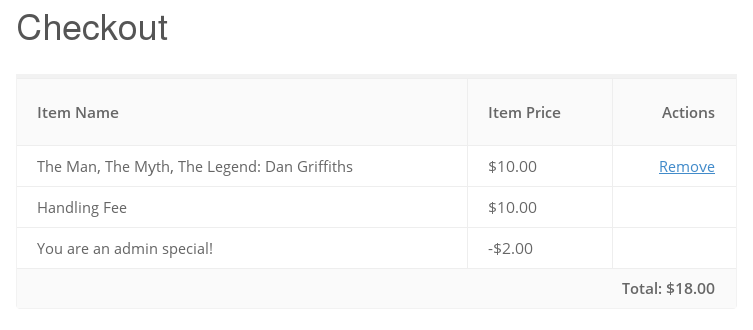EDD\Fees\Handler Class
The EDD\Fees\Handler class can be used to add arbitrary fees to the shopping cart, both positive and negative (discount) fees. For example, you could add a special 10% off fee automatically for all registered users that have a certain user role, or add a “handling” fee for all products inside of a certain category. The options are limitless.
Fees are stored as session variables, which means once they’re set for a user they’ll persist until either the user checks out or they’re removed by some code based on a decision or setting.
Types of fees
Fees can have two types:
fee: This is just what it sounds like–an additional cost or discount added to the entire purchase.item: This is a fee that is not associated with anything else. Think of it like a temporary product made up on the spot. Wallet deposits are an example of this kind of fee.
Note: negative fees always set no_tax to true.
add_fee()
Adding an expense or giving a discount are both considered adding fees, despite the fact that one of them is removing money.
Adding a fee is done with code similar to this:
function eddwp_set_admin_discount() {
// Check to see the customer is a site admin.
if ( ! current_user_can( 'manage_options' ) ) {
return;
}
// find 20% of the total
$amount = edd_get_cart_subtotal() * 0.20;
// Flip the 20% from a positive number to a negative number
$amount = $amount * -1;
// Add the fee, sending the amount, the reason printed to the front end, and the handle
EDD()->fees->add_fee(
array(
'price_id' => null, // set this to link the fee to a specific price ID.
'amount' => $amount,
'label' => 'You are an admin special!',
'id' => 'admin_special',
'type' => 'fee',
'no_tax' => false,
'download_id' => 0, // set this to link the fee to a specific product.
)
);
}
add_action( 'template_redirect', 'eddwp_set_admin_discount' );
This example automatically adds a 20% discount if the current user is an admin.
Here’s another example that adds a handling fee:
function eddwp_add_handling_fee() {
// Add a $10 handling fee no matter what
EDD()->fees->add_fee(
array(
'amount' => 10,
'label' => 'Handling fee',
'id' => 'handling_fee',
'type' => 'fee',
'no_tax' => false,
'download_id' => 0,
)
);
}
add_action( 'template_redirect', 'eddwp_add_handling_fee' );
Here’s a screenshot of both of the above examples being applied at the same time: 
remove_fee()
To remove a fee, simply pass the fee ID (third parameter above) to the remove_fee() method:
function pw_remove_handling_fee() {
EDD()->fees->remove_fee( 'handling_fee' );
}
add_action( 'template_redirect', 'pw_remove_handling_fee', 9999 );
Other Methods
In addition to simply adding and removing fees there are a number of methods for working with fees on the back end.
has_fees( string $type = ‘fee’ )
This method simply checks to see if any fees exist. Defaults to the fee type, but can accept item as well.
Example:
if ( EDD()->fees->has_fees() ) {
echo 'yep, we can haz fees!';
}
Returns: true or false.
get_fees( string $type = ‘fee’, integer $download_id = 0 )
This method will get an array of all existing fees. It can be limited by type and/or download id.
Example
The Simple Shipping extension is a perfect example of how the EDD_Fees class can be used.
$fees = EDD()->fees->get_fees();
Returns something like this:
Array
(
[handling_fee] => Array
(
[amount] => 11.00
[label] => Handling Fee
[type] => fee
[no_tax] =>
[download_id] => 0
[price_id] =>
)
[admin_special] => Array
(
[amount] => -2
[label] => You are an admin special!
[type] => fee
[no_tax] =>
[download_id] => 0
[price_id] =>
)
[tophers_fee] => Array
(
[amount] => 42.00
[label] => Topher's fee
[no_tax] =>
[type] => fee
[download_id] => 114
[price_id] =>
)
)
get_fee( string $id = ” )
This method will get an array of a specific fee, identified by the name it was given when it was created.
Example:
$my_custom_fee = EDD()->fees->get_fee( 'my_custom_fee' );
Returns something like this:
Array
(
[amount] => 42.00
[label] => The Final Fee
[no_tax] =>
[type] => fee
[download_id] => 114
)
type_total( string $type = ‘fee’ )
This method calculate the total for a specific type of fee. The types supported are ‘fee’ and ‘item’.
Example:
$item_total = EDD()->fees->type_total( 'item' );
Returns an number like 51.00
total( integer $download_id = 0 )
This method calculate the total for all fees OR all fees specifically attached to a given download.
Note: If a product has fees and variable prices, The fee will only be applied once per transaction, NOT once per item.
Example:
$total = EDD()->fees->total(); $total = EDD()->fees->total( '42' );
In the example above, the first would return a number like 51.00 that is the sum of all fees.
The second example would return a number like 51.00 that is the sum of all fees tied specifically to the Download with the ID of 42.
record_fees( array $payment_meta, array $payment_data )
This method records the fee information about a specific transaction. It should never be called directly.